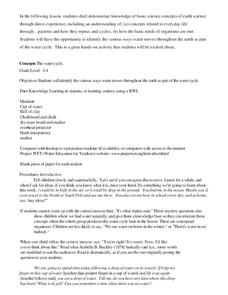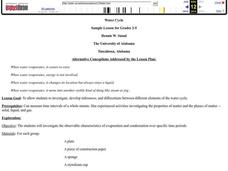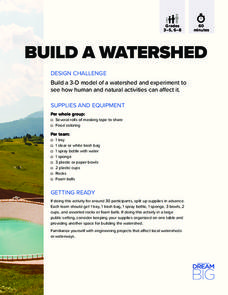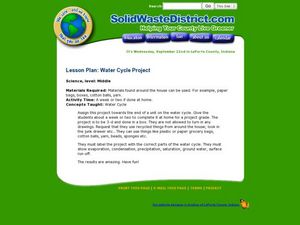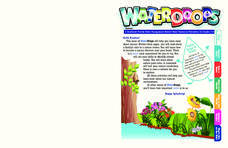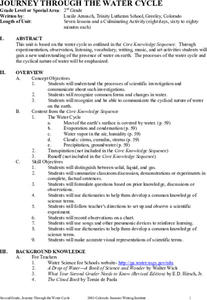Baylor College
What Is the Water Cycle?
Small groups place sand and ice in a covered box, place the box in the sunlight, then observe as evaporation, condensation, and precipitation occur. These models serve as miniature water cycles and demonstrations of the three phases of...
Curated OER
Understanding the Water Cycle
Investigate the water cycle and how water moves from the land to the air and back to the land. Create a terrarium and observe the water cycle at work. Define weather terms including evaporation, condensation, and precipitation.
Foundation for Water & Energy Education
What is the Water Cycle? Activity A
Hydrologists create a concept map about how water is used and a sentence strip defining water and describing its unique properties. Small groups work together to fill a small milk carton and compute the mass of water inside. The next...
Curated OER
The Water Cycle
Young scholars access prior knowledge of the water cycle by completing a KWL. In this water cycle activity, students follow the movement of water through the water cycle.
Curated OER
T3 Lesson Plan: Number 3
Sixth graders investigate local water. For this water cycle lesson, 6th graders take samples from surrounding water sources. Students record data from the samples, compare and graph the results.
Virginia Department of Education
The Hydrologic Cycle
There is the same amount of water on earth now as there was when it was formed. The water from your faucet could contain molecules that dinosaurs drank! Young scientists build their own hydrologic cycle model and observe it for five...
Curated OER
Water Cycle
Students investigate, develop inferences, and differentiate between different elements of the water cycle. They investigate the observable characteristics of evaporation and condensation over specific time periods
Virginia Department of Education
The Cycles of Nature
Encourage peer collaboration and assist with the creation of visual aids to identify carbon, water, and nitrogen cycles as your class learns more about nature. They discuss relative information, create a visual aid depicting the chosen...
DiscoverE
Build a Watershed
What's the best way to learn how watersheds work? Build one! Combining engineering, the water cycle, and ecology concerns, the activity is the perfect fit for an interdisciplinary unit. Teams construct a model watershed with simple...
Curated OER
Waterdrops
In this science learning exercise, students learn about water cycle, weather, clouds, storms and water resources by completing 8 pages of this full color newsletter. Students read a story, study weather maps, learn to make a rain gauge,...
Curated OER
Water Cycle Project
Students complete a water cycle project. In this Earth science lesson, students use recycled objects from around their homes to illustrate the water cycle. Students illustrate evaporation, condensation, precipitation, saturation, ground...
Curated OER
The Biogeochemical Cycles
The majority of this presentation is a collection of diagrams and graphs that back your lecture on biogeochemical cycles. The last few slides define ecosystems and the Gaia hypothesis. You may find these slides valuable, but will...
Curated OER
Ecological Cycles Part 1
Knowing about the hydrologic cycle is the first step to understanding the carbon cycle. Upper graders discuss the earth's water content, polar ice caps, and the concept of the ecological cycle as it applies to carbon, nitrogen, and other...
Curated OER
Moist Air & Clouds
Fifth graders study the weather and water cycle of clouds. In this water cycle lesson, 5th graders read background information about evaporation, condensation, and the states of water.
Curated OER
Waterdrops
In this environment learning exercise, students read an article about water drops and the nature center. They pretend that they are going to a nature center and write what they would hope see there. Students also identify living things...
PBS
Blow the Roof Off!
Blow the minds of young scientists with this collection of inquiry-based investigations. Based on a series of eight videos, these "hands-on, minds-on" science lessons engage young learners in exploring a wide range of topics from making...
Curated OER
Cloud Formation
Fifth graders discuss the weather and cloud formation. They rotate, in groups, through various activity stations set up in the room. Stations include activities such as researching types of clouds, drawing pictures of the water cycle,...
Curated OER
Exploring Ecology
Students explore the basics of ecology. They discuss ecological succession, the water cycle and human impacts on the environment. Students explore the owls, succession, the human impact on the environment and complete the "Incredible...
Curated OER
Water Topics
In this science learning exercise, students focus on the role of water in the environment and its many uses. They answer questions in the multiple choice and short answer form.
Curated OER
Rock Cycles, Crayon Cycles
Students examine the rock cycle and the path that rocks go through to rearranged in different ways. They define key vocabulary terms, then in small groups conduct a variety of experiments using crayon shavings as simulated rocks and...
Curated OER
The Case of the Missing Water
Students examine the major concepts related to the water cycle in this lesson. They recognize and define evaporation, condensation, precipitation and the natural cycles that occur as weather. They also participate in an activity of...
Curated OER
What is the Rock Cycle and Its Processes?
Geology beginners examine three different rock samples and determine their origin by their characteristics. By making and recording observations, they become familiar with features of igneous, metamorphic, and sedimentary rock types....
Curated OER
Earth: The Water Planet
Students elicit data on the water cycle, ocean topography, and island formation in this six lesson unit. The ocean floor and the properties of water are examined through a variety of discussions and hands-on experiments.
Curated OER
Journey Through the Water Cycle
Students canvass the water cycle in the seven lessons of this unit. The processes of the water cycle and the cyclical nature of water is emphasized inthis unit.





